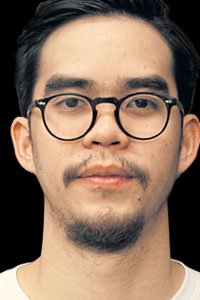As I write this, the latest Facebook status of Sombat Boonngamanong, leader of Thai pro-democracy group Red Sunday, reads: "Hong Kongers are not happy".
That simple statement must either be one of the most stupid and pointless things anyone could have posted online in response to the way thousands of people in Hong Kong have, since last week, been taking to the streets to oppose China's plans to control Hong Kong's 2017 leadership election. Or it could be one of the most thought-provoking and poignant posts we've seen recently.
It's a pointless thing to say because it's so obvious. Why would they be on the streets, defying tear gas and risking their lives, if they were happy?
For some Thais, however, there's a certain poignancy in Sombat's words. The sentence "Hong Kongers are not happy" doesn't seem to end where it ends, but is followed by
a series of questions in our heads about the situation in which we find ourselves. In fact, Sombat doesn't seem to be talking about the state of happiness in Hong Kong at all.
The people of Hong Kong are not happy, but what about the people of Thailand?
According to a 1984 agreement between China and the UK, Hong Kong, a former British colony which was handed back to China in 1997, would be a city with "a high degree of autonomy, except in foreign and defence affairs" for a period of 50 years after the transfer of sovereignty.
Beijing agreed that under the "one country, two systems" principle, Hong Kong would be a so-called Special Administrative Region governed in a different way from most of China, with its own legal system and certain civil rights.
The protesters in Hong Kong, a mix of students and members of a civil disobedience movement called Occupy Central, are angry because Beijing has recently revoked its promise that Hong Kongers would be allowed to choose their own leader, the chief executive, directly by means of universal suffrage by the year 2017.
Under the current system, the chief executive is elected by a 1,200-member electoral committee whose make-up is regarded by many as overwhelmingly pro-Beijing in its views and which is not seen as representing the true voice of the people at all.
Over the past few days, photos of an incident in February have resurfaced in the online world; they show PDRC protesters gathered to blockade a polling station to prevent ballots being cast in
a general election (subsequently voided by the Constitution Court). One image in particular — that of a man, who was on his way to exercise that most basic of rights, the right to vote, being grabbed around the throat by a PDRC supporter, one of a group wearing wristbands bearing the colours of the Thai national flag — has been juxtaposed online next to a photo of people in Hong Kong peacefully pleading for the "one person, one vote" principle to be respected.
Yet there are quite a few people who were quick to liken Occupy Central to the PDRC despite the fact that, on the surface at least, the two movements couldn't be going in more opposite directions.
We exist in a land of perverse logic where lies can easily become truths, and vice versa, depending on the person who utters the words.
We are told that we are happy because, according to Foreign Minister Tanasak Patimapragorn in his address to the United Nations General Assembly last Saturday, "Confidence has returned, and growth has been restored" and "we remain fully committed to democracy and human rights. And we know that we cannot go against the tide of democracy".
Perhaps more significant was an observation by Tanasak that the opposing political parties in Thailand had the chance to save democracy, but they failed to do so because they were unwilling to compromise for the sake of the country.
We Thais are told that we are happy because nobody goes out to protest on the streets any more.
We are told we are happy because the prime minister, Prayut Chan-o-cha, decided to continue with his regular televised speeches on Friday evenings, and because he's planning to write soap operas that can return happiness to us.
We are told that we are happy because, according to a recent Dusit Poll on public opinion vis a vis the Prayut administration (which was based on a very democratic nationwide survey soliciting the views of as many as 1,626 people), 53.6% of the population is "quite satisfied" and 36% is "very satisfied". But it seems we need to go far beyond the question of whether or not we are happy.
There will always be those who will back every political argument they make with a rhetorical question along the lines of "Do you realise how lucky you are to be born in this country?"
To people of that ilk, I would counter with a question of my own:
"Do you realise how depressing and embarrassing it has become to live in Thailand, the land of military-manufactured happiness and Thai-style hypocrisy?"
Kaona Pongpipat is a feature writer for the Bangkok Post's Life section.
